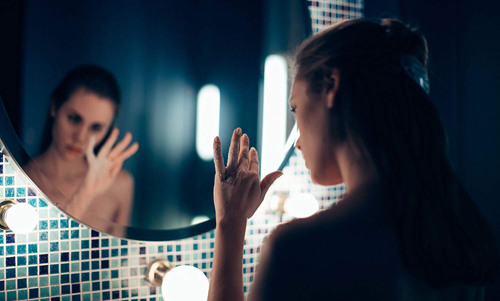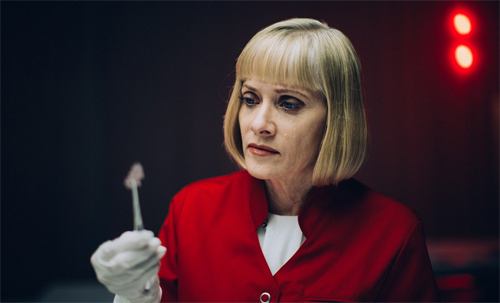Replace (2017)
Directed by: Norbert Keil
Written by: Norbert Keil, Richard Stanley
Starring: Barbara Crampton, Lucie Aron, Rebecca Forsythe
Available now on DVD and Amazon Prime
Time for a bit of good old fashioned body horror, a sub-genre which is often employed to get both the brain cells and the stomach juices swirling once the credits roll. Norbert Keil’s feature debut certainly offers this sort of material from the gruesome to the thought provoking, in a story which includes plenty of inspirations from stories about lost time, lost identities and everyday people find themselves the centre of a Metamorphosis. There also seems to be some connecting tissue with a monster of the week X-Files story called ‘2Shy’ for those who remember that classic season. But any good idea is only as good as its execution, and like the protagonist of this story it’s all a bit cracked and broken when put under the microscope.

The opening of the story finds Kira (Rebecca Forsythe) in a bit of a jam as she struggles to remember a date she was on with a man called Jonas (Sean Knopp). Is she staying in his apartment or her own? Was this one day ago or longer? Does she have a daughter or live alone? Maybe these are just memory fragments from a particularly excessive night out. There’s a certain level of dissociative behaviour going on as Kira dismisses some of these sudden flashbacks despite them being a pretty concerning indication that things are not what they seem. She thinks she’s a professional pianist but can’t play a simple scale, and her nosy neighbour Sophia (Lucie Aron) seems to think it’s just fine to wander in a take impromptu showers despite having only just introducing herself.
The style of the film also creates confusion, although perhaps not in the way the film-makers intended. There’s a very choppy style of editing on display which is often more jarring than dream like, and the hazy visuals and overly loud synthesizer music are often pretty distracting. Fortunately this isn’t an ongoing issue as the story unfolds, but it’s a rough and occasionally sloppy first act. Things change for the better both in terms of production design and acting as Kira visits skin specialist Dr. Crober (Barbara Crampton) who seems to have dropped in from another film entirely. Not only is her performance a welcome improvement (as well as a casting bonus for genre fans) but she seems to be working in a sci-fi laboratory covered in black tiles and red strip lights.
Kira is seeing Dr. Crober because of a strange dry patch of skin on her left hand that is rapidly growing. It’s a pretty interesting ailment, one that’s easy on the budget but high on relatability. At least until things start to become more outlandish. However things don’t really get interesting until Kira’s true nightmare begins, and it’s a shame that she can’t remember much about herself. There’s just not enough characterisation involved. She can apparently afford a fancy glass filled apartment and the best medical care, and she likes a cup of tea and the odd bottle of wine. But as a victim (and later as a predator) she’s never really much more than the sum of her symptoms.

Things do at least become suitably grotesque as Kira finds that her dead skin is growing all the way from her hand to her chest. But the really nasty stuff comes into play when she realises that it can be cut away… and replaced by healthy skin freshly sliced from somebody else. After a pretty gnarly sequence in a hospital morgue the narrative takes an almost vampire-like turn as she stalks through the local night-life to find fresh transplant donors. There’s yet more neon lighting in many of these sequences which dulls the shock of the violence, but it’s kind of stylish at least. There’s perhaps more Neon Demon than Rabid on display, but it’s mostly effective.
Her flashbacks and sudden dreams also become more creative as things go on. It’s just a shame that these moments are generally just window dressing, and the real relationship drama between Kira and Sophia is undercooked and at best feels pretty forced. This could all have been a far more interesting meditation on ageing, disease, and doomed romances, but it’s just not focused enough on the human drama. Kira’s day to day life is barely shown thanks to the amnesiac cliché and the film makers seem more interested in the gore. Admittedly the horror beats are mostly well done, but creativity on more than one front would have gone a long way. It would all be far more compelling if Kira was more of a monster, and at the same time more of a human being.
Seeing how a central character changes from innocent and naive to dangerous and violent is a standard arc after all, but it’s never explored. Elsewhere there are fleeting ideas involving strange futuristic technology and new medical breakthroughs, but the elements that might have pushed the story further into the realms of science fiction feel like afterthoughts. Maybe things like Dr. Crober’s research or Sophia’s flashy telescreen are parts of an earlier story draft that got left behind as the budget dwindled. There’s even an awkward fade-to-black ending that suggests this might have been a short film at one stage in development. Overall there are some interesting ideas being addressed here but it spends more time on schlock and violence than the more engaging themes presented. It’s all just a bit too flaky for its own good.






Be the first to comment